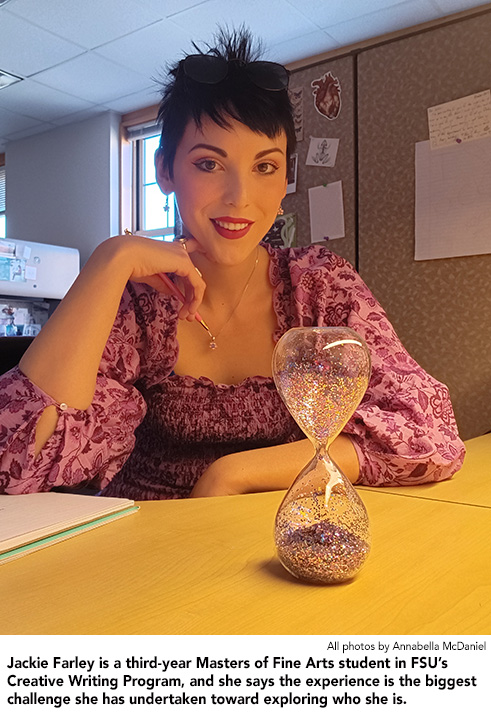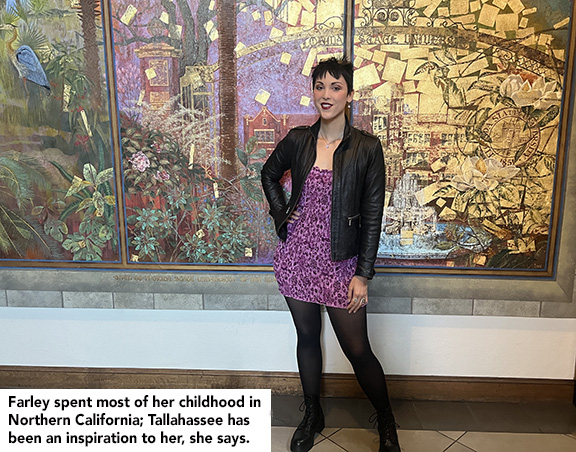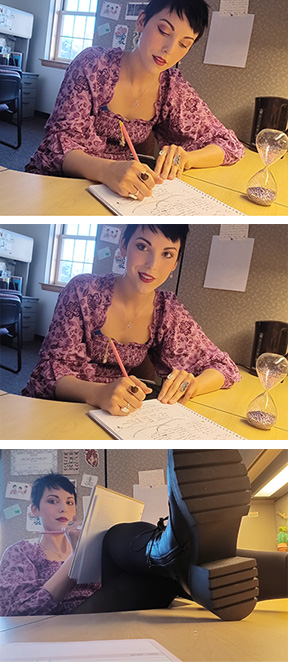M.F.A. student Jackie Farley encourages herself and others to discover authenticity and complexity through their creativity
By Annabella McDaniel
Jackie Farley finds inspiration in helping other people figure out who they are, especially through their creative expression.
As a third-year Masters of Fine Arts student at Florida State University, Farley describes the Department of English Creative Writing Program environment as an ideal place for that discovery to take place.
Farley believes there is power in embracing your own complexity, and she’s given herself permission to be many things at once during her experiences at FSU, loving herself even through the process of making mistakes or falling short of her expectations.
Authenticity and passion have helped Farley discover and enjoy her own freedom, and she wants the students in her classes to be able to as well.
“I admire authenticity and integrity in the people I’m with, and I try to hold that permission for my students to be themselves with me in their projects,” she says.
Farley has taught a First-Year Composition class, and she was a teaching assistant for English Professor Virgil Suarez in his Introduction to Poetry class, getting the opportunity to lead a few class sessions. In both of those teaching environments, she enjoyed understanding the students’ perspectives on the course material, especially their personal takes on classic poets, such as Allen Ginsberg and Frank O’Hara.
Farley describes university as being a place of opening for students to get to know who they are and what they like to read, and she was excited about engaging with them while they were at these beginning stages of self-exploration. She wants to see a person’s creativity, whether it’s through music, art, or writing, be true to the individual who is creating it.
“Show me that you were here on this earth, that you were alive,” she says.
One of the reasons Farley is so drawn to working in this way with students is her own experience in college. She attended Arizona Western College and the University of Arizona as an undergraduate, double majoring in English and Creative Writing, and she describes her time at those schools as an opportunity to learn about herself through literature, poetry, and writing.
As a continuation of this pursuit, Farley says she was drawn to FSU by the people in the Creative Writing Program: the faculty, the alumni, and fellow students. Specifically, Farley says she has enjoyed working with English department faculty members Barbara Hamby, James Kimbrell, David Kirby, Virgil Suarez, Cy Weise, and Lamar Wilson in the Creative Writing Program as well as Andrew Epstein and J. M. Kilgore in the Literature, Media, and Culture Program. She also chose FSU because the department has six poets in its M.F.A. Program instead of the two or three at most other schools. Alumni such as Kaveh Akbar, Paige Lewis, and Dorothy Chan were yet another draw for Farley.
Earning her M.F.A. is the biggest challenge Farley has undertaken toward exploring who she is. She describes FSU’s program as unique in that the academic commitment is three years rather than the typical two; the extra writing year was another major factor in her choice of graduate schools.
When she lived in Arizona, before deciding on a graduate program, she didn’t feel comfortable exploring some of her deeper thoughts; Farley needed space to think about who she was. During the past three years, especially through the writing year, she has experimented with self-expression—through her style, through her work, and through allowing herself to be many things at once.
“A philosophy also about identity that bleeds into my ideas about art and teaching: I think the loudest way to love somebody is to make them feel free enough to show you their true selves,” she says, “and the loudest way to love yourself is to honor your own complications regardless of what other people think.”
 Farley is playful and warm, and her creativity comes out naturally in the way she talks. In her writing, she considers heavy, complex subjects and presents them in striking and brutally honest ways while keeping them fun, or at the very least, darkly humorous.
Farley is playful and warm, and her creativity comes out naturally in the way she talks. In her writing, she considers heavy, complex subjects and presents them in striking and brutally honest ways while keeping them fun, or at the very least, darkly humorous.
A lot of Farley’s inspiration comes from pop culture, specifically the Y2K ethos—Cheetah Girls, sweatpants with “JUICY” written across the butt, for example. She believes that the internet and television have raised Millennials and Gen Z, and the exposure affects our brain chemistry: “you start thinking in fracture, and that’s what a poem is. It’s a series of images, kind of like a film strip,” she says.
Her goal is to write vibrantly, image after image, and tell a story through the emotional connective tissue between them. She compares writing to a menu: some things just sound good together. A poem, in her opinion, “should feel hot and heavy in the mouth, like a molten chocolate lava cake or a French kiss.”
In “My Ass Poetica,” she sensuously describes her poems’ fatty, buttery contents that tempt the reader to devour more, savoring them as they go down. In a similar vein, in “Some Mouthfeelings Keep Me Up at Night,” she writes about the violence that lurks in mouths, specifically from an experience she had getting catcalled and a story from her high school about a girl’s head being slammed into a toilet. This poem was her first successful one.
In her first year in Tallahassee, at a Jerome Sterns Reading Series event at The Bark, Farley read “Some Mouthfeelings Keep Me Up at Night,” which existed then under the title “I’m a Series of Violent Beard Fantasies.” She has another upcoming reading at the local vegan restaurant on Feb. 20, with Alyssa Freeman-Moeser, who is an FSU M.F.A. student in Creative Writing-Fiction.
Tallahassee itself has been an inspiration to Farley. She spent most of her early childhood in Northern California, and she remembers driving with her mother through the region’s redwoods and almond orchards.
“I think those experiences translate into my hobby of just driving around Tallahassee for funsies to find other dusty spots that I’ve maybe overlooked,” she says. “Driving helps ground me a lot here, which is important for me and my writing.”
Old things and secrets attract her attention, and she anticipated Tallahassee as being “like your grandparents’ old attic and searching around for hidden things that people have forgotten.” Places like these are independent, quirky, ethereal, or eclectic—places with character.
Some of her favorite spots she has found are Alfred B. Maclay Gardens State Park, Railroad Square, Midtown Reader, The Bark, Calvin’s Coffee House, Black Dog Cafe, Fermentation Lounge, Stone Age, Quarter Moon, Crystal Portal, and the Other Side Vintage.
The Other Side Vintage is where Farley found a December 1989 issue of Penthouse that inspired one of her poems; the magazine had article titles such as “Korean Massage Parlors: The McDonald’s of Sex,” “Japan’s Bloody War on Dolphins,” and “Incest: The Mother’s Story.” Her poem, she says, was a way for her to poke fun at patriarchal entitlement and examine the experience that comes with living in a woman’s body in an entertaining, playful way.
Other writers inspire her as well. In Farley’s first spring semester at FSU, she took a Letters of the Poets class, in which a collection of Emily Dickinson’s letters was part of the reading assignments.
 “I quickly recognized that she was just another weird girl like me or anyone else with her own internal world,” Farley says, “her desk at a window, underplaying her talent in a world where she didn't think we’d still be talking to her now.”
“I quickly recognized that she was just another weird girl like me or anyone else with her own internal world,” Farley says, “her desk at a window, underplaying her talent in a world where she didn't think we’d still be talking to her now.”
Based on that sentiment, she wrote “You’re Not Like the Other Emily Dickinsons” as a way to talk and connect with one of most well-known poets of the 19th century. A second poem of hers inspired by the idea of talking with Dickinson is called “My Little Force Explodes, and Explodes, and Explodes.” Patricia Lockwood, Hera Lindsay Bird, Megan Falley, Kendra DeColo, Haryette Mullen, Tara Hardy, Natalie Diaz, and Kim Hyesoon are on Farley’s list of favorite poets. Along with Tati Tibbles’s “A Sugar Daddy is Essentially an Arts Patron,” one of her current favorite poems is “The Saddest Fuck in the History of Lacan” by Theresa Sahyoun.
“The poem encapsulates an objectification and loneliness that AFAB folx, in particular, might encounter in heteronormative interactions with men,” she says. “But, of course I think it resonates with anyone who has sex; the partner’s performing, objectified body sometimes becomes a place where the other person deposits their pent-up emotions rather than engaging in intimacy and connection.”
To Farley, that experience is one of the most devastating she can imagine.
“It’s hard enough to encapsulate in casual words, let alone such delicate poetry,” she explains. “But it’s something that still often goes unspoken, and I hold a great appreciation for things that can be spoken.”
Farley explores similar themes in her poems “I Don’t Get Reverse Cowgirl,” “The Saddest Part About Faking an Orgasm” and “Somebody Puts Their Dick in You.”
In fact, the female experience is a major theme in Farley’s writing. She describes her poetry as “a collage of my girlhood… as beautiful, messy, crazy, ugly, or pretty as that is.” Through her poem “Girls Girls Girls,” for example, she expresses how she hates being conformed to just one characterization when girlhood and femininity are so multiplicitous.
Farley defines her main method for writing as a “girly-pop rant,” which shows her humanity and leads the reader somewhere more profound; with this approach, she can get you to empathize, she can get you to smile.
Her poem “Just Remember, Little Pig” explores what the Big Bad Wolf would say to the Little Pig if they had the pig cornered. In Farley’s mind, the wolf is a woman who does what she can to survive: “So don’t judge me for wanting some bacon; you would want some too if you were me,” she writes, expressing another shade of her femininity.
Ultimately, she writes for people: to be read, to read, and the performative quality of it all. She uses poetry for self-discovery—and, in turn, to help people discover who they are, too.
Annabella McDaniel is an English major on the Editing, Writing, and Media track, with a minor in humanities.
Follow the English department on Instagram; on Facebook; and on X.
